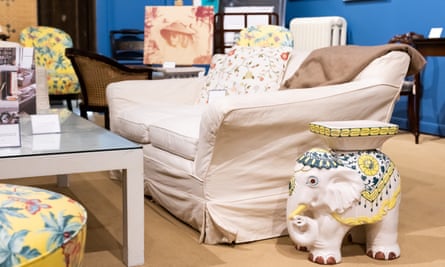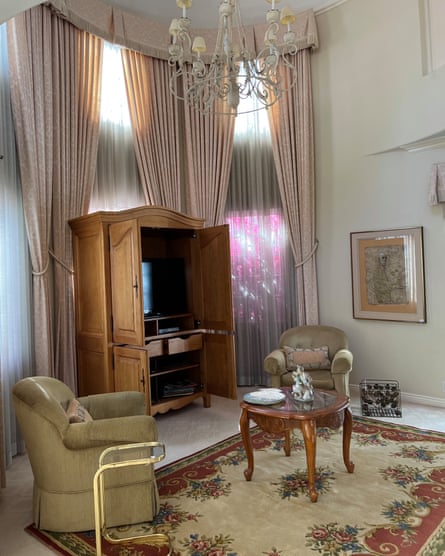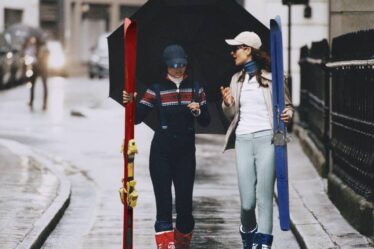
In a private home in Cheviot Hills, Los Angeles, Amy Byer is playing the piano wearing white leather gloves and a gold 1960s chinoiserie robe. The walls behind her are full of mid-century artwork. In the kitchen beyond sit stacks and stacks of antique china.
Byer is the founder of Handled Estates, a glossy estate sale service which packages up the contents of homes across California – like this one, where a sale took place last weekend in LA – and posts them on Instagram to drum up attention before they open their doors.
Each sale usually spans several days, but can be as much an opportunity to peek inside the gilded lives of the wealthy as they are to find a treasure.
On Wednesday in New York, a similar sale is taking place of the estate of the writer Joan Didion. Among the 244 lots from her Upper East Side apartment to be auctioned at Stair galleries in Hudson, bidders will trawl through her iconic Celine tortoiseshell sunglasses, a framed photograph of the writer looking pensively at the camera by photographer Brigitte Lacombe, even her scratched Dutch oven. At time of writing, her Le Creuset set is selling for $8,000. The sunglasses? $27,000.
Estate sales are big business in the US, particularly when it comes to the rich and/or famous. In August, Sheryl Crow opened her Nashville home to the public in an estate sale which included, most notably, a collection of antique rocking horses and a strange clown painting. Last month, Pharrell Williams put 52 of his possessions up for sale on his new auction platform Jupiter (think diamond-encrusted chains and a custom 18-carat gold-encased BlackBerry), while the V&A recently bought a rare tea and coffee set designed by Paul Follot from the estate of Karl Lagerfeld (it was last sold during an auction of Lagerfelds’s estate in December 2021 for €6,300).
At Julien’s Auctions in California, Elvis Presley’s 1972 gold and diamond Ebel watch recently sold for $256,000, while John Lennon’s wire-rimmed glasses sold for $162,500. If rare fashion finds are more your thing, I am sorry to tell you that earlier this year you missed out on the wardrobe of former Italian Vogue editor Franca Sozzani, who died in 2016, at the Fondazione Sozzani in Milan. Lots included Azzedine Alaïa dresses and a blue python Miu Miu coat.
These sales are growing in popularity in the UK too, with antique dealers sourcing items from death estates and auctions of celebrity memorabilia from houses such as Sotheby’s and Christie’s. And there is always the internet – Quinn Garvey, a 25-year-old American vintage collector, regularly racks up tens of thousands of views from around the globe recording her estate sale finds on TikTok. “I’ve been at sales that have a Renoir etching in the living room and a collection of beagle-themed calendars in the kitchen. You never know what you’re about to discover,” she says.
For bargain-hunters, who will queue for hours outside a home in the quest for a rare treasure, this is where the magic lies. A hunt usually begins on a website – EstateSales.Net is a popular one – which allows American users to enter their zip code and view sales in their area. Then it’s time to queue.
“Interest in these sales is at an all-time high,” agrees Marta Indeka, foresight analyst at a strategic foresight consultancy, The Future Laboratory. “More than ever, consumers want rare items – limited edition and discontinued pieces – which is driving the growth of the resale market more broadly.” This goes some way to explain why Didion’s desk went for almost $30,000. “When it comes to auctions of private collections, it’s taking this one step further – you can purchase a moment in time.”
Perhaps unsurprisingly, the sales can feel eerie. After all, most sales occur in the event of a death, take place in the home of the deceased, and sometimes with family members present.

“Generally the vibe is fun but I’ve been to a few creepy ones,” says Macy Harris, a 30-year-old LA-based ‘content creator’ who regularly attends sales. “There was one apartment in Beverly Hills that felt particularly weird, the family were all lined up around this table squabbling about money. I found a few vintage coats which I grabbed, and ran.”
Byer knows the delicacy of these sales all too well. There is the issue of money, of course – estate sale services take a commission of the sales, typically 20-50%. Proceeds from the Didion sale will be split between a Parkinson’s charity and a scholarship for women in literature, though elsewhere, they seem to be a good way to pay off debts or simply make money. This can cause family friction – the idea that you can buy art their loved one hung on their walls, the bag they cherished, the mug they used for their morning coffee. “People often say to me, ‘Oh, that’s so sad. How could you do that for a living?’ But is it sad? Really?” says Byer. “I think of it as a grand finale – it’s a wonderful event to celebrate someone’s life.”.
The same happens with celebrities. “At the Didion auction, there are probably family members thinking, ‘where on earth did they find that’ looking at some of the items listed,” says Byer. When her own mother died in 2015 she handed the keys to the Florida and Cincinnati homes to an estate sale company and got on a plane back to LA, only to feel her heart sink when she saw the blanket she used to nap with listed for $5. “I thought, ‘Oh God, I have to get that back’,” she says. She bid on it and got it.
The sentimentality attached to each piece is a huge draw for strangers, too. “If I connect with a story, it pulls me to the sale,” says Harris, recalling an auction at the home of a former beauty pageant queen where the walls were covered with glamorous self-portraits and the rooms stacked with rails of luxury clothing. “It feels special for me to go and get something from a person if they were interesting.” From the one-time Miss USA, she scooped two pairs of Halston heels and a white embroidered cushion that reads “Wanted … hugs and kisses”. For others, it’s the thrill of a bargain that excites them. “My favourite find is a suede Apple Bottoms coat from a Malibu estate sale for $20,” says Garvey. “What can I say, I’m nostalgic.”
But while finding pieces on Vinted or Depop is one thing, venturing into the homes of the people who wore them first is quite another. Vintage clothes and accessories can seem imbued with invisible traces of the person who wore them, used them, loved them; but at estate sales you also see exactly who the former owner is – or was.
Under the carefully curated light of estate sale services, such as Byer’s, that is no bad thing for buyers.
“Often, these aren’t famous people – yet there’s still a buzz when a sale opens. That’s a fabulous thing.”



